Overview
This article serves as a comprehensive guide for wineries seeking to master Search Engine Optimization (SEO) to elevate their online visibility. It underscores the critical role of:
- Local SEO strategies
- Keyword research
- Technical optimization
- Performance tracking
Collectively, these elements empower wineries to attract more visitors and drive sales growth by ensuring they prominently feature in search results for wine-related queries. By implementing these strategies, wineries can not only enhance their online presence but also significantly increase their customer base and revenue.
Introduction
In today's competitive market, understanding the digital landscape is not just beneficial but essential for wineries aiming to differentiate themselves. Search Engine Optimization (SEO) emerges as a formidable tool that enhances visibility and attracts local customers, ultimately driving sales growth.
However, many wineries encounter significant challenges navigating the intricacies of SEO—from mastering keyword research to optimizing technical elements.
How can wineries effectively leverage SEO strategies to not only bolster their online presence but also foster enduring customer relationships?
Understand the Basics of SEO for Wineries
Search Engine Optimization (SEO) is a crucial method for enhancing your website's visibility on search engines like Google. For wineries, this translates to ensuring that when prospective clients search for wine-related terms, your winery prominently appears in the results through SEO for wine. Key elements of SEO include:
- Understanding how indexing systems operate
- Recognizing the importance of keywords
- Appreciating the role of content in attracting visitors
Familiarize yourself with terms such as 'organic results,' 'keywords,' and 'backlinks' to lay a solid foundation for your SEO strategy.
Effective SEO tactics for vineyards focus on optimizing your website for local queries, which is vital for attracting nearby clients. By incorporating location-based long-tail keywords, such as 'best wine estate in [region],' you can significantly enhance your visibility. Additionally, establishing and refining a Google My Business profile is essential for boosting local search results, making it easier for potential customers to discover and visit your establishment. Industry specialists emphasize that optimizing your Google My Business profile can greatly enhance your presence in local searches, as supported by various case studies.
The for small businesses in the wine industry cannot be overstated. It serves as a cost-effective marketing strategy that builds long-term value, in contrast to paid advertisements that stop yielding results once funding ceases. By investing in effective SEO practices, you not only increase your online presence but also cultivate customer loyalty through improved user experience and engagement. As Lucy Hazleton points out, the most effective keywords can fluctuate frequently, highlighting the necessity for ongoing keyword research.
Experts in the industry stress that wine producers must adapt their SEO strategies in response to market dynamics. Regular keyword research remains essential, as the best-performing keywords can change often. By understanding and implementing effective SEO for wine practices, businesses within the wine sector can enhance their visibility, attract more visitors, and ultimately drive sales growth.
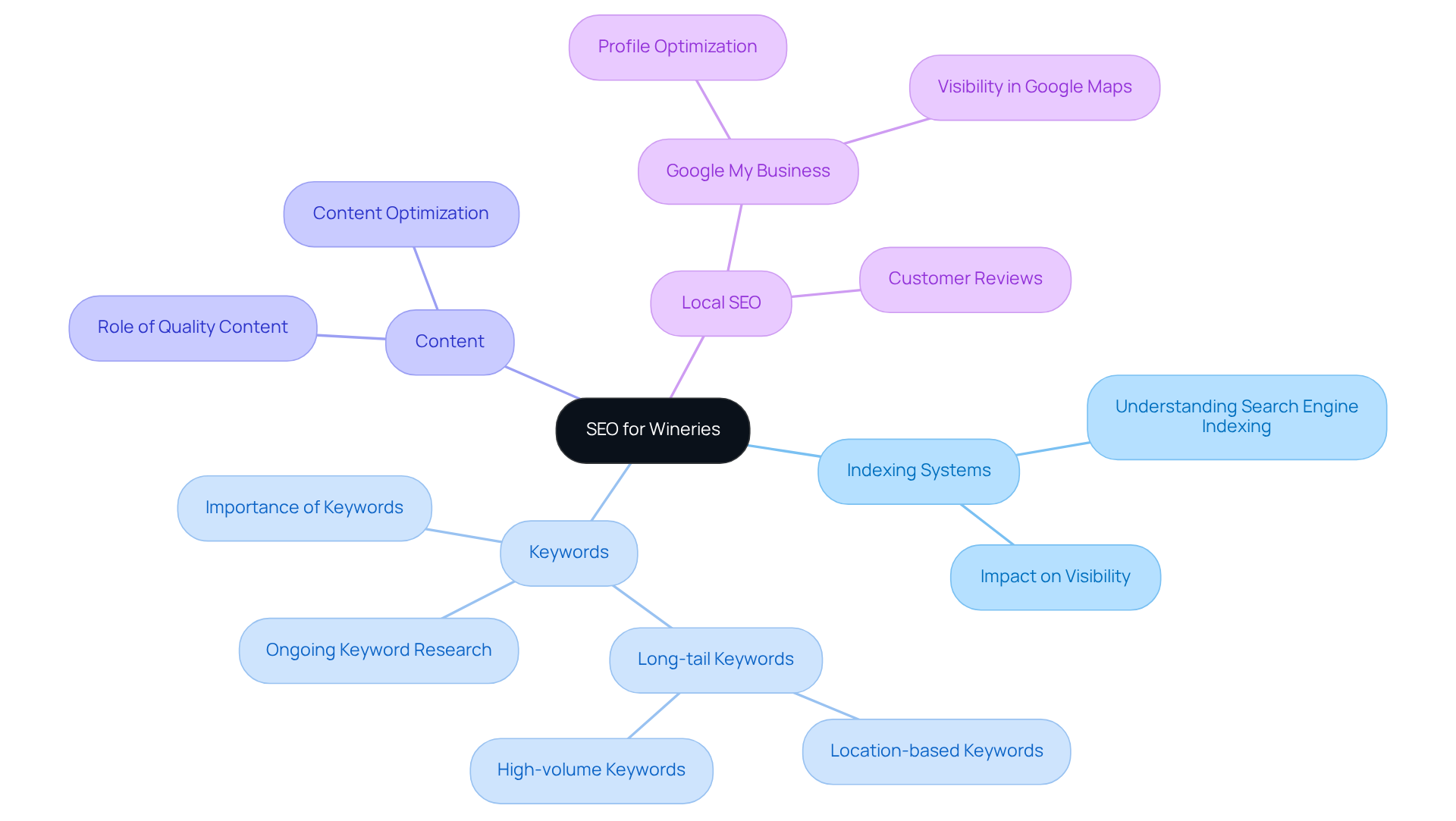
Conduct a Comprehensive SEO Audit
Commence your SEO audit by thoroughly evaluating your website's current performance. Leverage tools such as and Google Search Console to collect crucial data on traffic, bounce rates, and user behavior.
- Are there technical issues hindering your site's effectiveness?
- Examine for broken links, slow loading times, and mobile responsiveness.
- Furthermore, assess your site's structure, focusing on URL formats and navigation.
- Document your findings meticulously; this will create a clear picture of where improvements are not just necessary, but essential.
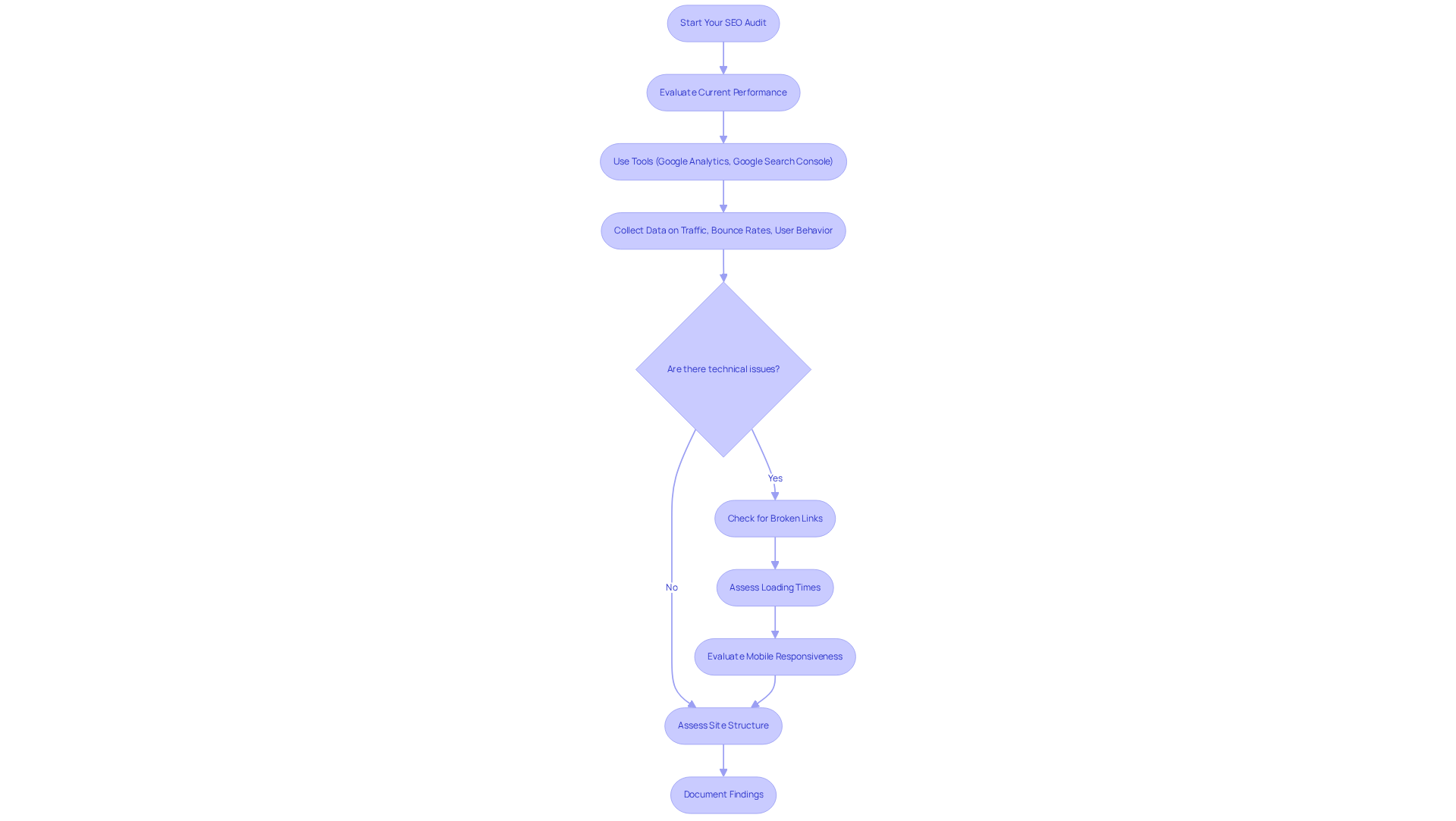
Perform Targeted Keyword Research
Harness the power of keyword research tools such as Google Keyword Planner, SEMrush, or Ahrefs to uncover pertinent keywords for your vineyard. Focus on both short-tail keywords, like 'wine,' and long-tail keywords, such as 'best family-owned vineyard in Napa.' It's crucial to consider factors like , competition, and relevance to your offerings. Compile a targeted list of keywords, ensuring the inclusion of local keywords and incorporating SEO for wine, that resonate with your brand and align with customer interests to effectively attract nearby clientele.
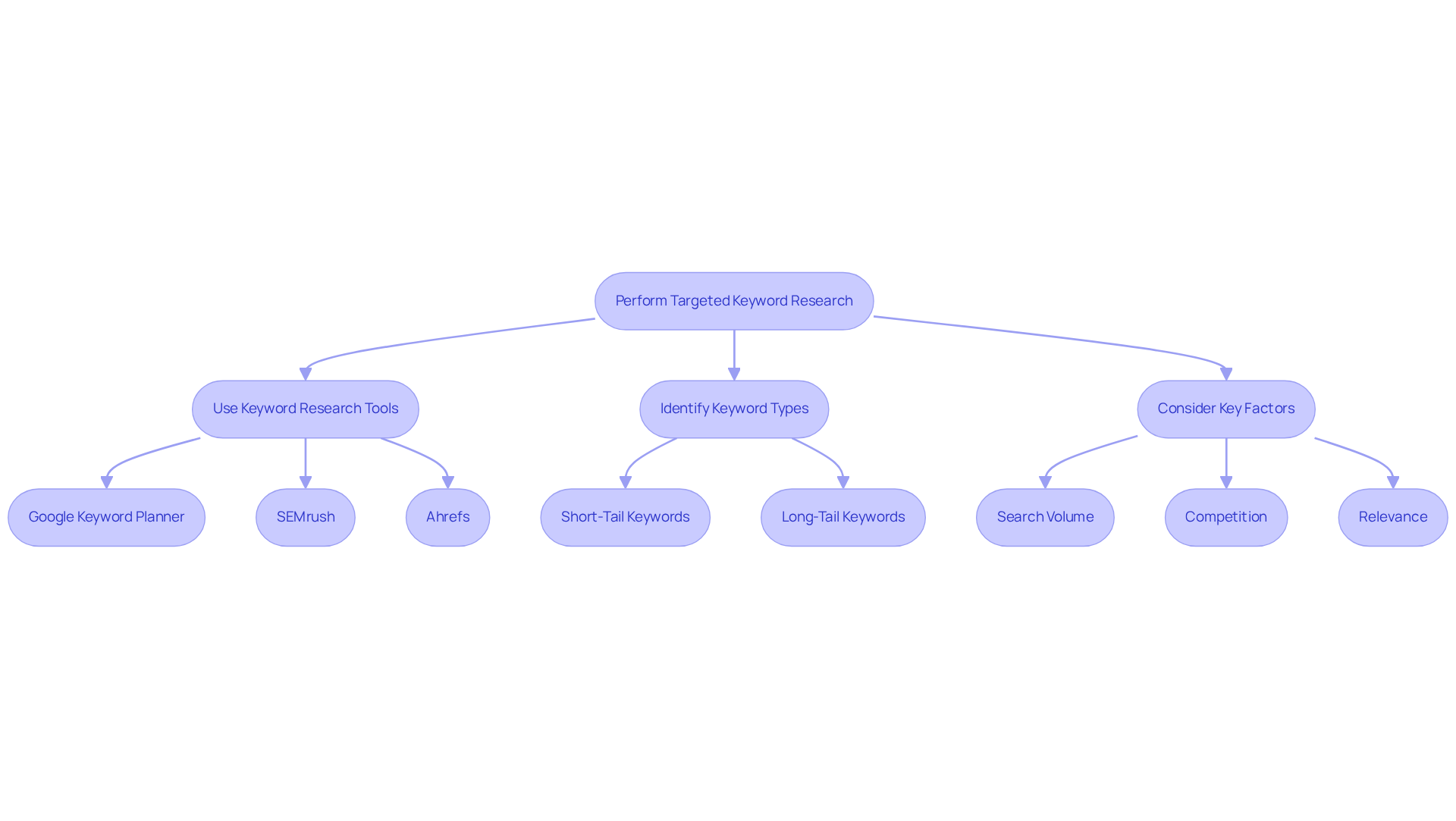
Optimize Technical SEO Elements
Optimizing technical SEO elements is essential for wineries seeking to enhance their online presence with effective SEO for wine. Prioritize site speed and mobile compatibility, as these factors significantly impact user experience and search engine rankings. Research reveals that 53% of mobile users abandon a site if it takes longer than three seconds to load, highlighting the critical need for fast-loading pages. Implementing strategies such as image compression and efficient hosting can drastically improve load times, leading to higher retention rates and conversions.
Mobile optimization is equally vital, particularly since Google employs mobile-first indexing. A mobile-friendly website can achieve conversion rates that are significantly higher than those of non-optimized sites. As web developers emphasize, a responsive design ensures users enjoy a seamless experience across devices, crucial in a marketplace where 40% of online transactions occur via mobile devices. Highway 29 Creative notes, "Mobile-friendly websites have significantly higher conversion rates than those that aren’t optimized."
In addition to speed and mobile-friendliness, ensure your website features a clean URL structure and intuitive navigation. This not only improves user experience but also facilitates simpler crawling by indexing engines. Developing an XML sitemap is another effective strategy, as it aids engines in indexing your pages more efficiently, thereby enhancing your site's prominence.
Moreover, applying structured data markup can bolster your online presence by providing engines with more context regarding your content. This not only assists in improved indexing but can also lead to in search results, enhancing click-through rates. According to case studies, schema markup implementation has been shown to enhance visibility in search engine results, including local search features. By focusing on these technical SEO elements, vineyards can significantly elevate their online presence through SEO for wine and attract more visitors to their websites.
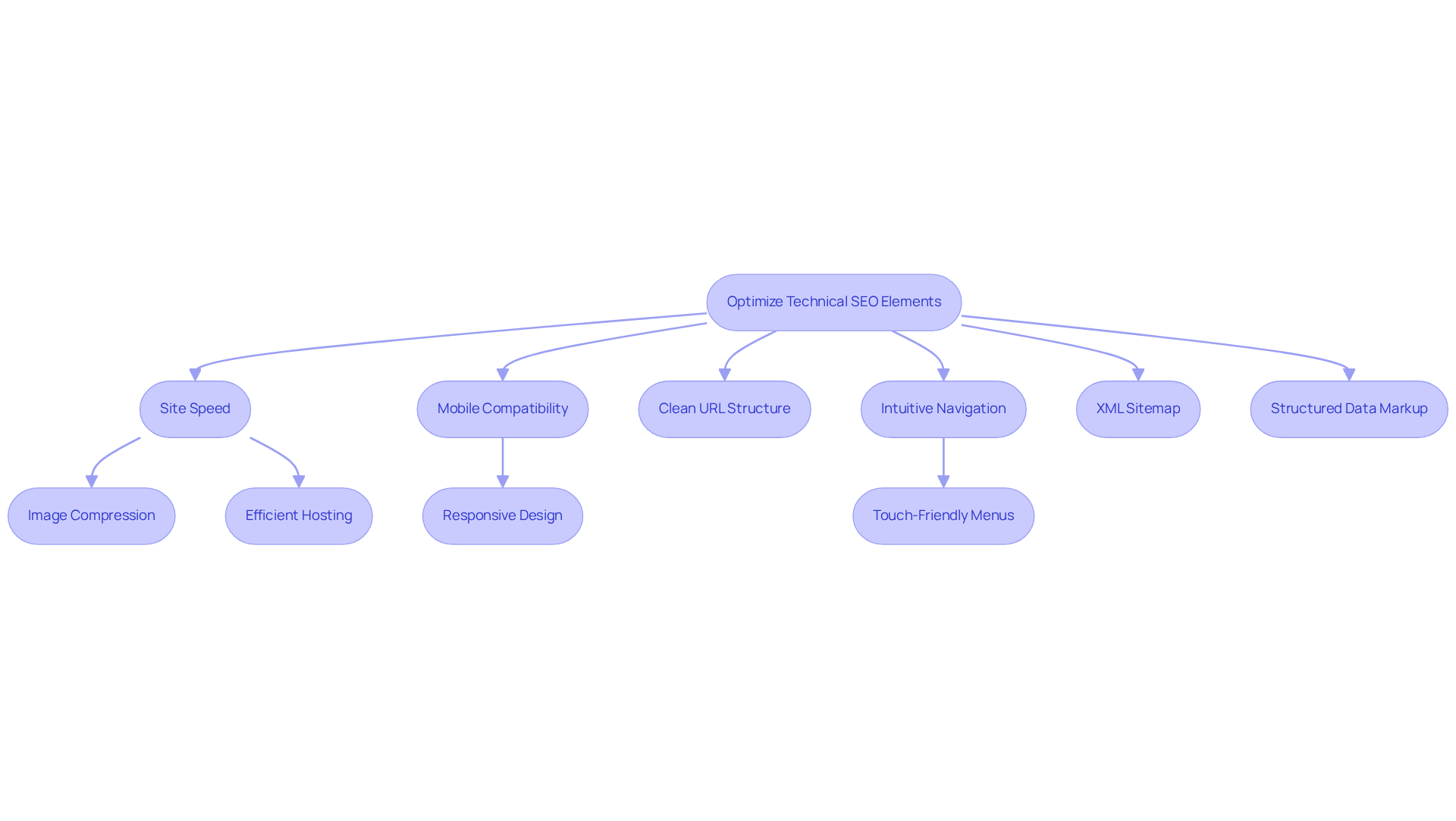
Enhance On-Page SEO Strategies
To enhance your winery's online presence, it is crucial to implement effective on-page optimization strategies as part of your SEO for wine. Begin by seamlessly integrating target keywords into your titles, headings, and throughout the text. Each page must have a unique meta title and description that accurately reflects its content; studies indicate that applying SEO for wine through optimized meta titles significantly improves engagement, leading to higher click-through rates. Furthermore, leverage high-quality images paired with descriptive alt text to elevate user experience and enhance your SEO for wine performance. Regularly refreshing your content is essential, as new and relevant information signals to indexing systems that your site is active, positively impacting your rankings.
Moreover, tracking user behavior, conversions, and top-performing queries is vital for refining your content strategy. Optimize your Google Business Profile and ensure consistent NAP (Name, Address, Phone) information to enhance SEO for wine. Additionally, embrace voice query optimization by incorporating natural, question-based phrases within your content. Utilizing such as Organization, LocalBusiness, Product, Event, and FAQ can further enhance your visibility in search results. By implementing these strategies, your establishment can leverage SEO for wine to distinguish itself in search results and attract a greater number of visitors.
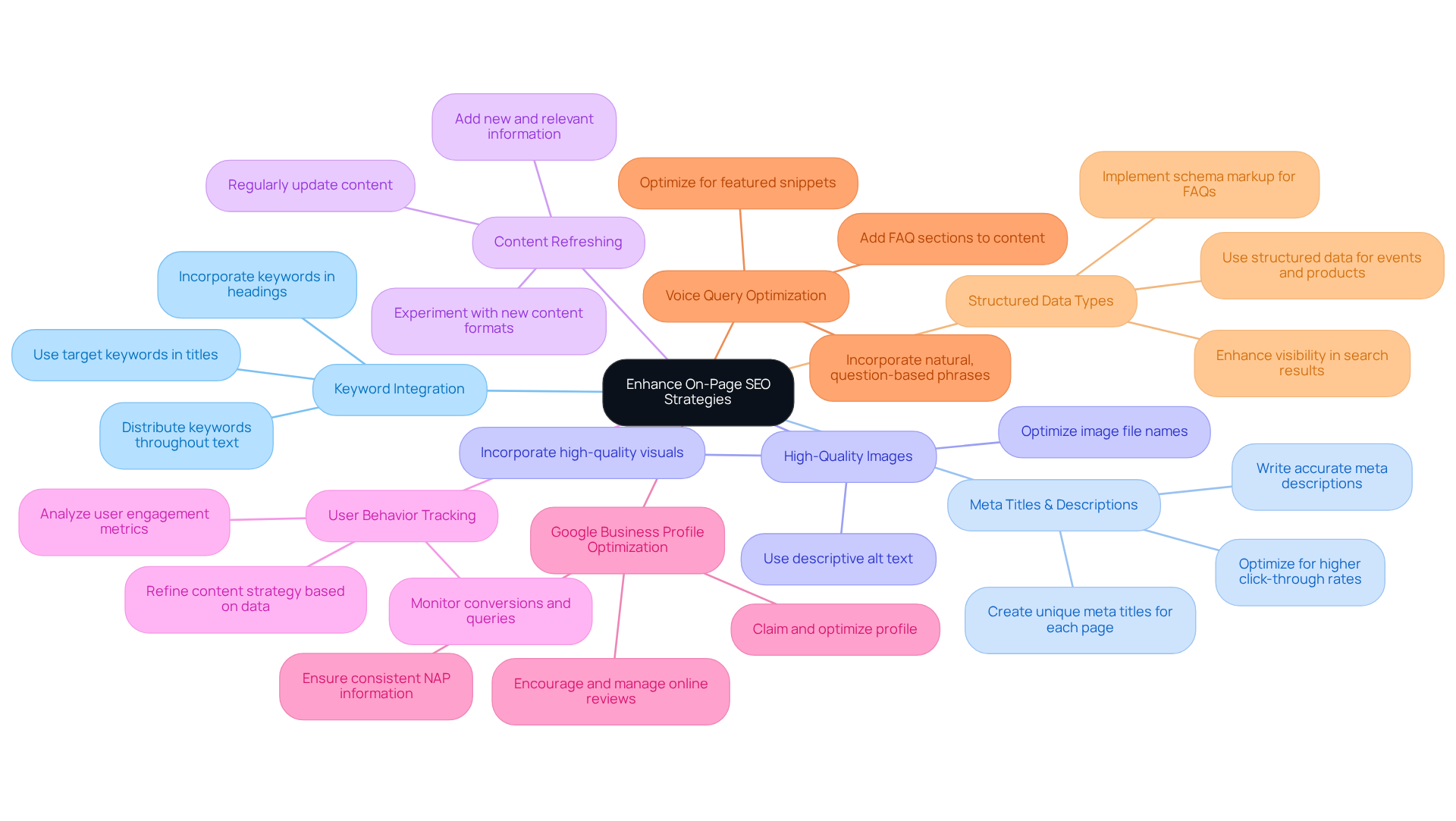
Implement Off-Page SEO Techniques
Establishing high-quality backlinks is essential; partner with local enterprises and engage in wine festivals. This strategy not only but also conveys the unique story of your establishment.
By actively interacting with your audience on social media platforms, you can draw visitors back to your site, emphasizing the narratives that set your establishment apart.
Furthermore, encourage satisfied clients to leave feedback on platforms like Google My Business and Yelp. Positive reviews can significantly elevate your establishment's reputation and visibility, transforming occasional purchasers into loyal club members.
This multifaceted approach not only bolsters your SEO but also aligns with direct-to-consumer strategies that promote sustainable growth.
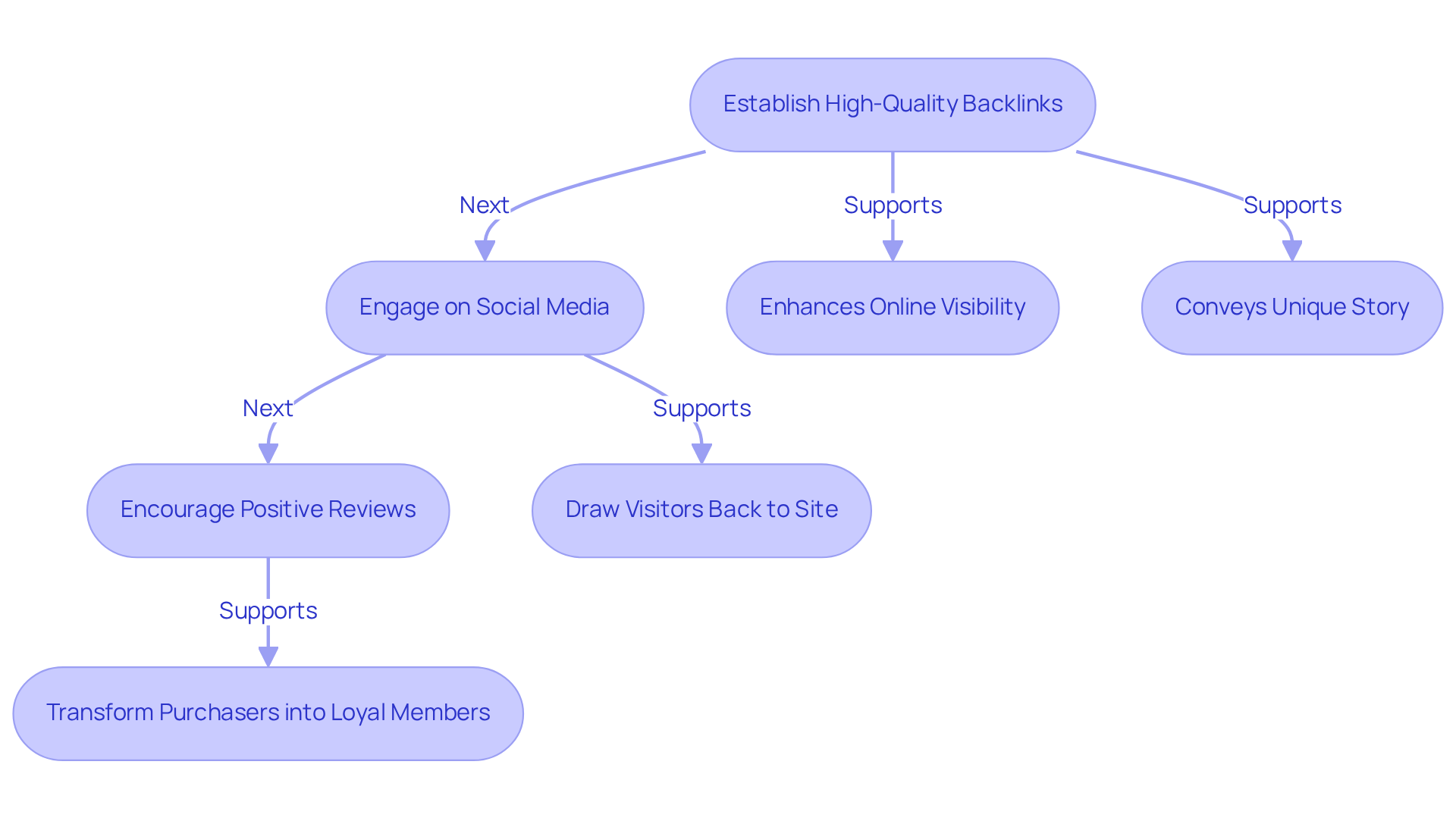
Master Local SEO for Wineries
Claiming and optimizing your Google My Business (GMB) listing is essential for enhancing local search visibility. Start by ensuring that your establishment's address, phone number, hours of operation, and website link are accurate and up-to-date. To attract specific nearby customers effectively, incorporate naturally into your website content and meta tags, such as 'family-friendly wineries in [region]' or 'organic vineyards near [town].'
Encouraging satisfied customers to leave positive reviews can significantly boost your online reputation. Listings with favorable reviews are more likely to be visited, demonstrating the power of social proof. Responding promptly to reviews—both positive and negative—shows your commitment to customer satisfaction and can improve your local search rankings. Regularly updating your GMB profile with current events, promotions, and engaging content will further enhance your visibility and credibility in the competitive wine industry.
Additionally, utilizing high-quality images can increase engagement; listings with photos receive 42% more requests for driving directions. Consistent NAP (Name, Address, Phone Number) listings across platforms are vital for confirming your establishment's legitimacy and improving local SEO. Incorporating insights from GMB can help track user interactions and refine your marketing strategies.
Remember, mobile optimization is crucial, as over 60% of Google searches come from mobile devices. Lastly, utilizing header tags to divide content and incorporating local keywords will improve your on-page SEO. Grasping the four pillars of SEO for wine—on-page, off-page, technical, and content strategies—will offer a thorough approach to your online presence.
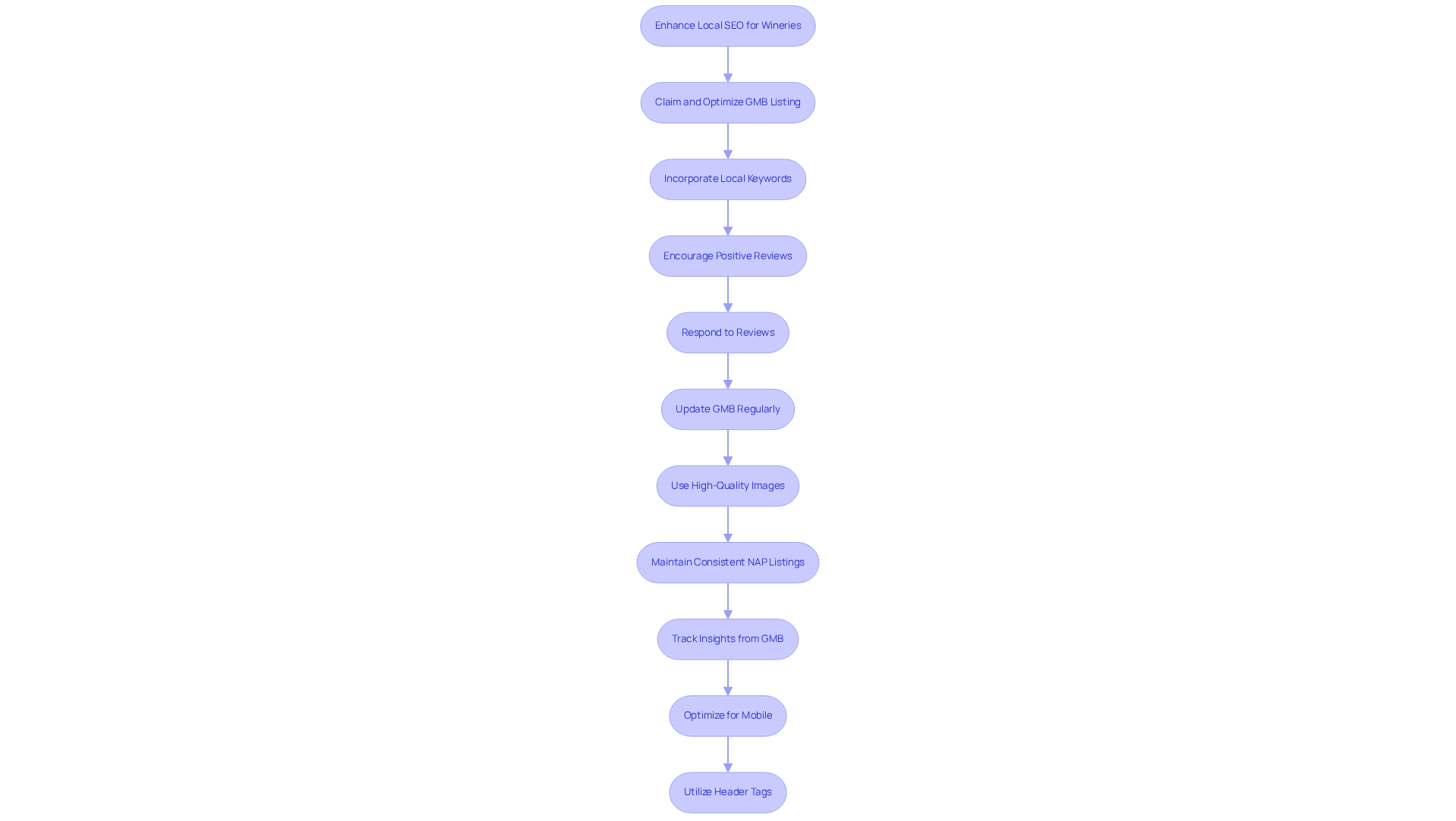
Track and Analyze SEO Performance
Utilizing tools such as and Google Search Console is not just beneficial; it is essential for vineyards aiming to monitor their website's performance effectively. Focus on key metrics like organic traffic, bounce rates, and conversion rates. By analyzing which keywords drive traffic, wine producers can refine their SEO for wine strategies, enhancing visibility and engagement.
Regular monthly reviews of SEO for wine efforts are crucial for identifying areas needing improvement and adapting to the latest trends and algorithm updates. For instance, establishments that actively track their organic traffic growth often report significant increases, with some noting up to a 191% rise in e-commerce sales. This underscores the importance of monitoring these metrics.
Furthermore, with over half of online browsing occurring on mobile devices, ensuring mobile optimization is vital for maximizing engagement and conversions. Staying informed about these metrics not only helps in optimizing current strategies but also positions wineries to capitalize on emerging opportunities through effective SEO for wine in the digital marketplace.
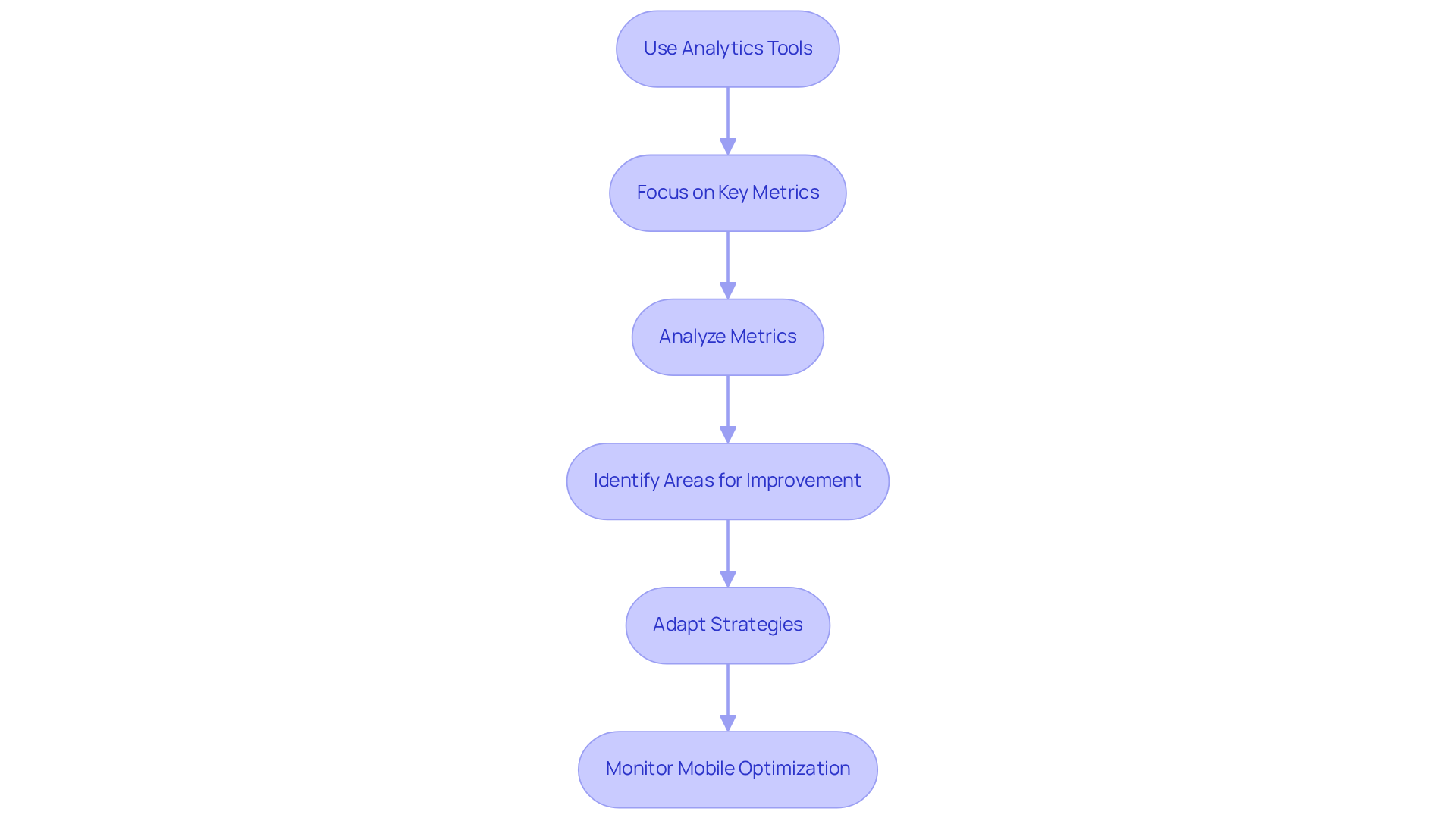
Conclusion
Mastering SEO for wineries is not merely a beneficial strategy; it is an essential component for thriving in the competitive wine industry. By grasping the fundamentals of SEO, conducting thorough audits, and implementing targeted techniques, wineries can significantly enhance their online visibility and attract a broader audience. This comprehensive approach guarantees that when potential customers search for wine-related terms, your winery stands out prominently in search results.
In this guide, we have highlighted key strategies, including:
- The importance of local SEO
- Effective keyword research
- Technical optimization
- Engaging content creation
Each of these elements plays a critical role in building a robust online presence. Furthermore, regularly tracking and analyzing SEO performance is vital, as it enables wineries to adapt their strategies according to evolving trends and consumer behavior.
Ultimately, investing time and resources into SEO for wine not only drives traffic but also cultivates lasting customer relationships. Wineries are encouraged to embrace these practices, continually refine their strategies, and leverage the power of digital marketing to ensure sustained growth and visibility in an ever-changing marketplace. By prioritizing SEO, wineries can transform their online presence and thrive in the digital age.
Frequently Asked Questions
What is SEO and why is it important for wineries?
SEO, or Search Engine Optimization, is a method for enhancing your website's visibility on search engines like Google. For wineries, it ensures that when potential clients search for wine-related terms, the winery appears prominently in the results.
What are the key elements of SEO for wineries?
Key elements of SEO include understanding how indexing systems operate, recognizing the importance of keywords, and appreciating the role of content in attracting visitors.
How can wineries optimize their website for local searches?
Wineries can optimize their website for local searches by incorporating location-based long-tail keywords, such as 'best wine estate in [region],' and by establishing and refining a Google My Business profile to boost local search results.
Why is a Google My Business profile important for wineries?
A Google My Business profile is essential for enhancing local search visibility, making it easier for potential customers to discover and visit the winery.
How does SEO serve as a marketing strategy for small wineries?
SEO is a cost-effective marketing strategy that builds long-term value, unlike paid advertisements which cease to yield results once funding stops. Effective SEO practices increase online presence and cultivate customer loyalty.
Why is ongoing keyword research necessary for wineries?
Ongoing keyword research is necessary because the most effective keywords can fluctuate frequently. Regularly updating keyword strategies helps wineries stay relevant and visible in search results.
What steps should be taken to conduct a comprehensive SEO audit?
To conduct a comprehensive SEO audit, evaluate the website's current performance using tools like Google Analytics and Google Search Console. Check for technical issues, such as broken links and slow loading times, and assess the site's structure, focusing on URL formats and navigation.
What technical issues should wineries look for during an SEO audit?
Wineries should look for broken links, slow loading times, and mobile responsiveness as part of their SEO audit to ensure the site's effectiveness.




